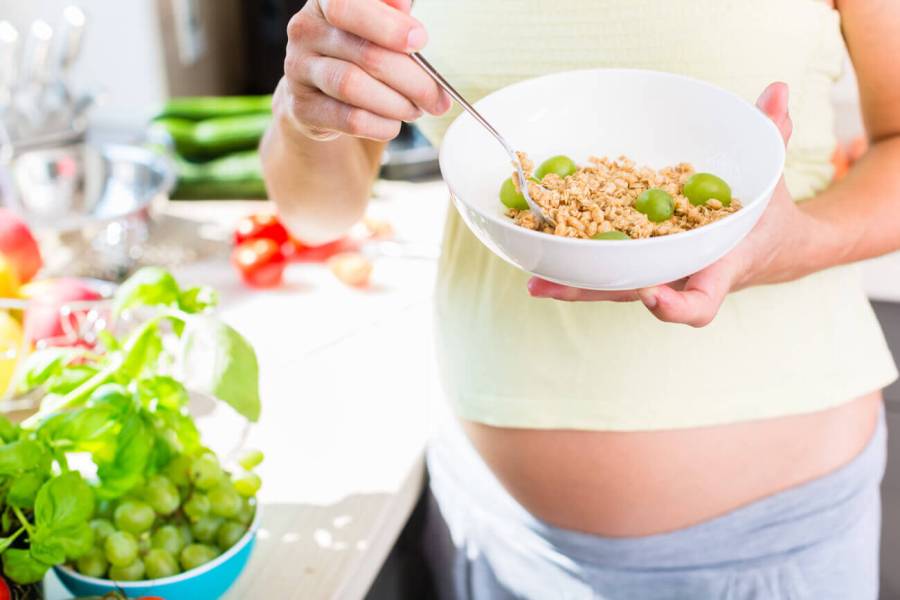We all know we should eat a healthy and well-balanced diet and I am not here to tell you what you ‘must’ be doing.
If you are like me, you probably have good intentions around food, but the realities of life can sometimes make it hard to maintain. What I believe and try to advise is that you can have a little of what you want. 80% healthier food options and 20% for your treats Nutrition can go out the window when adjusting to life with a newborn, snatching some toast here and a chocolate bar to keep you going. Don’t worry we have all done it, but a few simple changes can make sure you eat well and provide you and your baby the much-needed nutrients. This is a much more manageable and realistic option for women, rather than denying yourself altogether and dramatically changing your lifestyle, you can enjoy what you like and eat better.
Benefits for your baby
The food you eat will cross over to your baby in the womb. From 24 weeks your baby is able to taste the food you eat and are wired to like these foods when beginning to start weaning. A diet high in fat, sugar and processed foods throughout pregnancy and breastfeeding has been identified to influence children to prefer these foods, increasing their risk of obesity, heart disease and diabetes later in life. This diet has also been suggested to alter the actual DNA of a fetus, showing a link to poor prenatal diet and conditions such as ADHD and behavioural problems.
Research is mounting on the benefits of good nutritional diet from when the baby is in the womb right up until their 2nd birthday. It is between this time that a child lays the foundations for their brain development, healthy growth and builds a strong immune system. Scientific evidence shows that the foundations of a person’s lifelong health – including their predisposition to obesity and certain chronic diseases are set during within this 1,000 days from conception to 2 yrs.
Benefits for mum
Healthier options in food not only benefit your baby but obviously will have health benefits for you. You are less likely to put on excessive weight throughout your pregnancy and more likely to return to your pre-pregnant birth weight sooner. The ‘eating for two’ moto is well and truly out the window – women only need 200 calories in the third trimester (28-40wks). This increase in calories is equivalent to a piece of wholemeal toast with peanut butter and banana – great breakfast option .
.
Excessive weight gain in pregnancy has been identified as increasing the risk of developing pregnancy complications such as pre-eclampsia, gestational diabetes and increases the risk of having a caesarean section. With a reduction in processed and high sugar foods you are also less likely to put on large amounts of weight in your pregnancy. Another benefit is that you won’t to have that ‘hangry’ feeling!
Top tips for healthy diet in pregnancy and the postnatal period:
- Cooking from scratch automatically increases the nutritional value of your food and if time is an issue you can always freeze batches of food.
- Try to change over to wholemeal foods – bread, pasta and brown rice. If you can’t do all try at least 2 of these 3. Will make a huge difference to your energy and blood sugar levels.
- Don’t forget your protein. Protein is essential for growth, repair of the body and great at providing energy. Try to include protein into your daily diet; animal sources such as fish, meat, eggs are great sources of protein. If you are a vegetarian or vegan try to eat grains, pulses and cereals.
- If you crave a sweet treat try to go for the less processed foods. Fruit, crackers with a nut butter and honey, or an oatbar or try a few slabs of dark chocolate rather than milk chocolate (tends to be more processed).
- Remember to drink – often we feel hungry when we are haven’t drunk enough. Just check in and see when you last had a drink. At least 2-3 litres a day when pregnant and breastfeeding.
- Try to eat little and often in the later stages of pregnancy as you can suffer quite badly with heartburn. You may find that if you have a large meal you will be swigging on the Gaviscon!
- Once your baby is born remember to have at least 3 meals a day, without food and water you will not produce enough milk for your baby. It is easy to forget to eat when you are adjusting to life with a newborn, but you do need to prioritise yourself to eat and eat well.
- Keeping to a low sugar and low processed diet in the first 3 months may help reduce the risk of colic for your baby.
It seems simple to say but after a couple of weeks of better choices you will really begin to feel a difference in your energy levels, sleep and physical shape. A little change can have a massive impact on you and your baby’s health.
Emma Mills -Private midwife can advise and support in the antenatal and postnatal period. Visit the website and speak to the team.
Reference:
Prenatal unhealthy diet, insulin-like growth factor 2 gene (IGF2) methylation, and attention deficit hyperactivity disorder symptoms in youth with early-onset conduct problems :by J Rijlaarsdam, C Cecil, E Walton, M Mesirow, C Relton, T Gaunt, W McArdle, E Barker in The Journal of Child Psychology and Psychiatry: Aug 2016
LINK website: 1000 days nutrition
